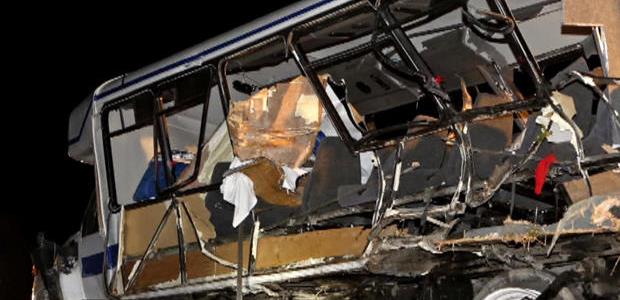
NTSB Blames Crash on Trucker's Use of Synthetic Cannabinoid
The truck crossed a median on I-35 near Davis, Okla., on Sept. 26, 2014, and struck a medium-sized passenger bus carrying members of the North Central Texas College softball team, four of whom died in the wreck. The board's report says this crash demonstrates the need for seat belt use laws with primary enforcement for all vehicles.
The National Transportation Safety Board on Nov. 17 called on the Federal Motor Carrier Sfety Administration to determine how many commercial motor vehicle drivers are using impairing substances, particularly synthetic cannabinoids, and to develop a plan to reduce their use, as well as
help motor carriers address drivers’ use of substances not covered under current drug-testing regulations. NTSB made the recommendations in its report on the Sept. 26, 2014, collision of a tractor-trailer with a medium-sized passenger bus after the truck crossed the I-35 median near Davis, Okla., and collided with the southbound bus.
Four members of the North Central Texas College softball team on that bus were fully or partially ejected in the collision and died in the wreck.
NTSB determined early on that the truck driver had not braked or taken any evasive steering action despite traveling more than 1,100 feet after leaving the left northbound lane of the interstate. NTSB said it identified the truck driver’s use of synthetic cannabinoids as a safety issue "based on his toxicology results, his lack of corrective action as he departed the roadway, and his history of drug use." The board said research is needed on the extent of synthetic cannabinoids use among commercial motor vehicle drivers, and the inconsistency between the substances currently covered by federal drug-testing regulations and the stated ban on the use of any impairing substances while driving "should be resolved."
The bus was equipped with seat belts, but none of the passengers wore them and the college's seat belt use policy was not enforced, according to the board's report. It says this crash demonstrates the need for seat belt use laws with primary enforcement for all vehicles.
In addition, the truck-tractor was equipped with two recording devices but neither was a dedicated event data recorder, and the bus had no such recording systems. Having crash data on driver inputs and vehicle dynamics could aid investigators and researchers and lead to safety improvements, the report states.Although no median barrier was in place at the crash site at the time, Oklahoma has developed more advanced guidelines for median cable barriers, it states.
The board recommended that the National Highway Traffic Safety Administration develop and require compliance with a side-impact protection standard for all newly manufactured medium-size buses, regardless of weight and that the Federal Highway Administration disseminate information to state departments of transportation about the circumstances of the Davis crash and the Oklahoma Department of Transportation's revised median cable barrier guidelines that resulted in the installation of a median cable barrier at the crash site.
Another recommendation to the American Trucking Associations, American Bus Association, United Motorcoach Association, Owner-Operator Independent Drivers Association, and Commercial Vehicle Safety Alliance asked that they inform their members about the dangers of drivers' use of synthetic drugs and encourage them to take steps to prevent drivers from using these substances.